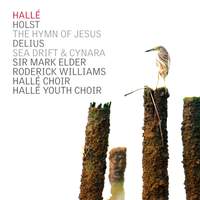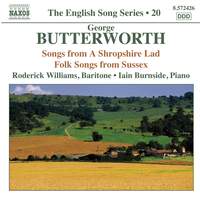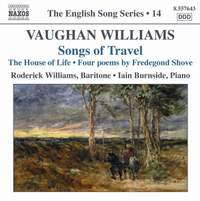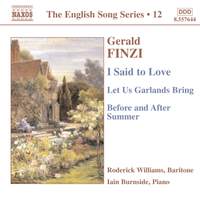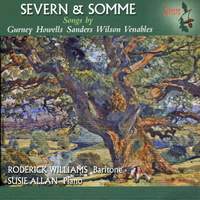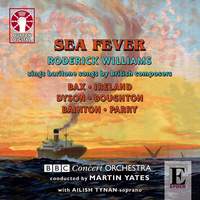Interview,
Roderick Williams warms up for The Last Night of the Proms
 There was much excitement at Presto HQ when it was announced that Roderick Williams would be the soloist at this year's Last Night of the Proms, as the charismatic British baritone is something of a local hero: based just up the road from us, he's a frequent (and ever-charming) visitor to our shop in Leamington Spa, and his regular appearances at festivals and concert-series in the area are always highlights of Warwickshire's musical year (his spellbinding, warmly communicative performance of Finzi's By Footpath and Stile with the Carducci Quartet at last year's Leamington Festival will live with me for a long time).
There was much excitement at Presto HQ when it was announced that Roderick Williams would be the soloist at this year's Last Night of the Proms, as the charismatic British baritone is something of a local hero: based just up the road from us, he's a frequent (and ever-charming) visitor to our shop in Leamington Spa, and his regular appearances at festivals and concert-series in the area are always highlights of Warwickshire's musical year (his spellbinding, warmly communicative performance of Finzi's By Footpath and Stile with the Carducci Quartet at last year's Leamington Festival will live with me for a long time).
Amid the preparations for Saturday's extravaganza, Roddy very kindly spared some time to talk to me about his memories of The Proms, his sartorial plans for the big night, and of course that elephant-in-the-room, nationalism…
What makes the Proms special for you as a performer, and how does it compare to other major music festivals around the world?
>The most obvious thing is that many of the audience are standing; for some reason this makes a huge difference to the formality of a Proms performance. It's not that the music is being dumbed down - far from it; it's more that you get a sense that the space is full of enthusiasts, people who love their music but maybe wouldn't be in the habit of paying top price to attend concerts at the country's premiere venues. In the nicest possible sense, it brings out the classical music trainspotter... so you know that you are performing to a hugely appreciative and most likely knowledgable audience. There's no atmosphere like it that I can think of.
What were your first experiences of the Proms – from both sides of the stage?
>I was first taken to a prom when I was a sixth former by a couple of friends who had already been going for some years. I don't remember having gone to many classical concerts as a boy other than those that I was playing in at school so it was already quite novel to be in the audience and witness professionals playing music right in front of me. But because it was the three of us lads going to London without our parents, it also felt quite cool and independent and I felt I was discovering the Prom experience for myself. We queued all afternoon and got a great spot in the arena quite close to the front. I remember it was quite hard to stand all the way through but the music-making made the time fly past.
>I think my first Prom as a performer was the one and only time I sang with The Sixteen; we sang Schoenberg's 'Friede auf Erden' as well as a Bach Cantata in the first half. A young tenor who had once been in the choir sang the solos that evening called Mark Padmore (I wonder what happened to him?). I remember viewing the Promenaders with a little suspicion - how could a classical concert audience be having such a good time? I didn't think it was something to be encouraged...
What exactly will you be singing on the Last Night? (The Proms website is a little ambiguous as to who’s doing what!)
>I shall be taking part in the Strauss Cantata 'Taillefer' that crowns the first half of the concert; it's a rare work, setting a poem about the Norman invasion of England. It will be a terrific Last Night piece - noisy, tuneful, heroic... My role is that of William the Conqueror and I get to place the English crown on my head as I stand in the field amongst the English dead; this might be a good time to wave the flags a bit...
>In the second half I shall be back to sing a couple of lighter numbers and then I shall lead the singing of Rule Britannia. That will be quite enough for one night, I think!
The programme also includes several of your own arrangements: were these prepared specially for the occasion, and will you be the first Last Night-er to appear in a dual capacity like this?
>'Joshua fit de battle of Jericho' and 'Ol' Man River' are my own voice and piano arrangements which I have used in recital in the past; the BBC let me orchestrate them for the full symphony orchestra which was a wonderful leap of faith on their part. It has been a hugely enjoyable experience to hear my notes played by such wonderful musicians and they were very gentle in giving me hints and suggestions when I asked for feedback. Where else could you solve a question of harp writing with the answer - "Just use two harps"?
>Sakari Oramo, who will be conducting, recently orchestrated some songs for this Proms season so I cannot claim to be the first.
Every year there’s much discussion in the press about the political and cultural implications of the Last Night, especially in terms of imperialism and nationalism: where do you stand on this debate?
>People are free to read onto the Union Flag whatever political message they wish. It will mean different things to voters North of the border with the Scottish referendum only a week after the concert. Viewers in Northern Ireland have their own tensions over this flag. Even far right political groups may wish to try to claim the flag as their own... in which case I think it is appropriate that I, as a person of mixed-race heritage (or whatever term is most current), feel perfectly at ease with this symbol of national identity. I feel myself to be very English and very British and, as such, I feel the same sense of pride in my country as I do when watching the Olympic procession of countries at the opening of the Games.
>It seems a little strange that one need apologise for this. If there were any suggestion that, as a result of such waving flag waving and the singing of traditional Proms songs, the audience in the Hall or at home would be inspired to take to the streets and commit acts of violence and intimidation against minorities, then that would be abhorrent. Likewise, if people felt, through this music, better able to invade countries for their oil or territory, that would be detestable. However, my belief is that those who take part in this concert, in the Royal Albert Hall, at massed outdoor venues or in their homes around the world, will simply wave a flag, be it Union or of their own country, and sing their hearts out because it is such a momentous occasion. A simultaneous, pan-global singalong can't really be a bad thing, can it?
Many of your predecessors have pulled a bit of a sartorial surprise out of the bag for the final stretch of the Last Night: can you give us a tiny clue as to what you’ve got up your sleeve?!
>I can't reveal too much now except to observe that it is usually the women at the Proms who get to wear the glamorous dresses and wear the diamonds and pearls. We men can't compete with that... unless of course you go down the road of Conchita Wurst (Eurovision Song winner) and embrace your inner mezzo. (I also note that no naturists have yet appeared at the Last Night... the ultimate solution to the 'what shall I wear?' question.) Hopefully I can come up with something fitting for the occasion…
Selected recordings from Roderick Williams
Williams is the soloist on two neglected but rewarding Delius works (Sea-Drift and Cynara) with Sir Mark Elder conducting the Hallé orchestra and choirs; Gramophone observed that '[Williams's] involvement is total...his heart-rending delivery...never fails to bring a lump to the throat.'
Available Formats: CD, MP3, FLAC, Hi-Res FLAC
Williams's recordings with Iain Burnside are the glory of the Naxos English Song Series, and this all-Butterworth recital is one of our favourites, including A Shropshire Lad and several lesser-known songs: BBC Music Magazine declared that 'Williams [is] rapidly becoming the voice of this repertoire - and not without reason.'
Available Formats: CD, MP3, FLAC
This performance of Vaughan Williams's Songs of Travel (one of the best-known song-cycles in English for male voice) is another gem in the series: The Guardian described the songs as 'ideally suited to the clear, clean tone of this exceptional baritone.'
Available Formats: CD, MP3, FLAC
Three cycles based on texts by Hardy and Shakespeare here (I said to Love, Let us Garlands Bring, and Before and After Summer; BBC Music Magazine observed that 'Williams's elegant and delicate performances reveal the heart of this music without forcing anything - and mercifully without that coyness that often mars Finzi performances.'
Available Formats: CD, MP3, FLAC
An innovative and affecting programme of songs based on First World War poetry, with the pianist Susie Allan; Ivor Gurney accounts for the lion's share, but there's also some Howells, as well as works by later composers John Sanders, Ian Venables and Christian Wilson.
Available Formats: CD, MP3, FLAC
Bax, Parry, Ireland, Bainton, Dyson and Boughton all crop up on this disc of orchestral songs by early twentieth-century British composers, recorded in 2007 with Martin Yates and the BBC Concert Orchestra; Gramophone praised Williams's 'quality of tone, clarity of diction and cleanness of style'.
Available Formats: MP3, FLAC
This disc would be remarkable enough for including the first baritone recording of Elgar's mighty Sea-Pictures (until now the province of mezzos and contraltos) with orchestra, but the four other premiere recordings (Gurney, Hurd and more Elgar) are equally noteworthy.
Available Formats: MP3, FLAC


